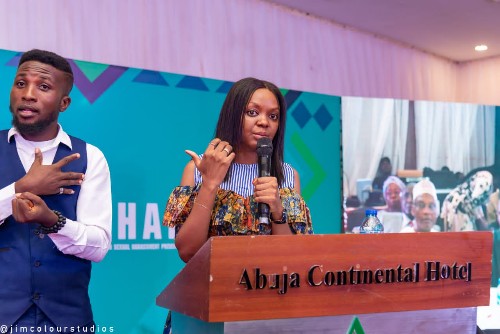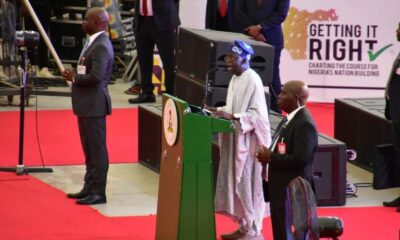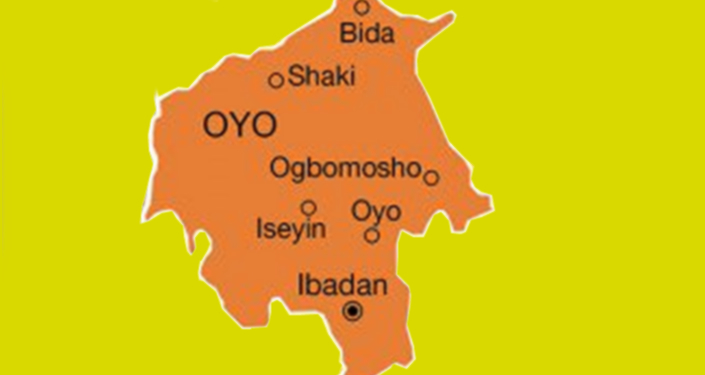In a landmark effort to tackle the pervasive issue of sexual harassment in Nigeria’s educational institutions, a coalition of stakeholders, including government officials, regulatory bodies, and civil society organizations, convened at the consultative Policy Dissemination and Implementation Conference held at Ladi Kwali Hall, Abuja Continental Hotel on July 9, 2024. The conference, moderated by Barrister Omowumi Ogunrotimi, underscored the urgent need for robust measures to prevent, prohibit, and redress sexual harassment across all levels of education.
The conference saw extensive deliberations and resolutions aimed at instituting effective anti-sexual harassment policies, ensuring the safety and dignity of students, and fostering a conducive learning environment free from intimidation and abuse. Key stakeholders, including the Ministry of Education, the Independent Corrupt Practices and Other Related Offences Commission (ICPC), the National Universities Commission (NUC), the National Board for Technical Education (NBTE), and various State Commissioners of Education, joined forces to endorse and commit to implementing comprehensive policy frameworks.
Highlights of the Resolutions:
1. Legislative Commitment: The House of Representatives, under the 10th Assembly, affirmed its dedication to passing the ‘Bill for an Act to Prevent, Prohibit and Redress Sexual Harassment of Students in Tertiary Educational Institutions and for Matters Connected therewith’. This legislative push aims to establish a robust legal framework against sexual harassment.
2. Model Anti-Sexual Harassment Policies: All stakeholders, including regulatory bodies and educational institutions, unanimously agreed to adopt and implement Model Anti-Sexual Harassment Policies. These policies are designed to sensitize communities, establish institutional frameworks for reporting and redress, and enforce strict penalties for offenders.
3. Regional Adaptation and Implementation: Acknowledging Nigeria’s diverse socio-cultural contexts, stakeholders from all geographical zones validated the policies with regional adaptations. This approach ensures that the policies resonate with local norms while maintaining the integrity of the national framework.
4. Enforcement and Support Structures: The ICPC committed to supporting educational institutions with training and technical assistance in implementing anti-sexual harassment policies. This support includes setting up grievance mechanisms, ensuring confidentiality, and protecting victims from retaliation.
5. Commitment to Review and Improve: Recognizing the evolving nature of the issue, stakeholders resolved to review the policies every 3 to 5 years. This periodic review aims to enhance effectiveness, incorporate best practices, and address emerging challenges in combating sexual harassment.
6. Supportive Measures: Stakeholders emphasized the importance of ongoing orientations for both new students and staff, wide-ranging reporting platforms including anonymous options, and clear timelines for investigating and adjudicating harassment cases.
Quotes from Key Stakeholders:
1. Professor Mamman Tahir, Minister of Education: “Our commitment to eradicating sexual harassment in educational institutions is unwavering. We will work tirelessly to ensure every student feels safe and respected.”
2. Dr. Musa Adamu Aliyu, Chairman of ICPC: “Prevention and enforcement go hand in hand. Our partnership with educational institutions will strengthen their capacity to uphold integrity and protect students.”
3. Hon. Victor Obuzor, Chairman, House Committee on Civil Society Organizations: “The legislative efforts and collaborative initiatives underscore our collective responsibility to safeguard students and uphold their rights.”
List of Stakeholders:
1. Professor Mamman Tahir – Minister of Education
2. Hon. Yusuf Tanko Sununu – Minister of State for Education
3. Minister for Women Affairs – Mrs. Uju Kennedy-Ohaneye
4. Dr. Musa Adamu Aliyu, SAN – Chairman of ICPC
5. Hon. Ibrahim Olarenwaju – Senior Special Assistant on National Assembly Matters (House of Representatives)
6. Hon. Victor Obuzor – Chairman, House Committee on Civil Society Organizations
7. Mr. Boniface Odey – NUC
8. Mr. Bello Abdul-Hakeem – Deputy Director, NBTE
9. Mrs. Theresa Madueke – Director, National Orientation Agency (NOA)
10. Prof. Amari Omaka – Commissioner for Tertiary Education, Ebonyi
11. Prof. Ndubueze Mbah – Commissioner for Education, Enugu
12. Hon. Yusuf Ibrahim Kofarmata – Commissioner for Higher Education, Kano
13. Prof. Nyerhovwo Tonukari – Commissioner for Higher Education, Delta
14. Dr. Gentle Emelah – Commissioner for Education, Bayelsa
15. Oluwole Olusanjo Majekodunmi – Commissioner for Education, Science and Technology, Ogun
16. Eluwole Sunday Adedipo – Commissioner for Education, Osun
17. Salihu Abdulwaheed Adelabu – Commissioner for Education, Science and Technology, Oyo
18. Hon. Lydia Haruna Tsammani – Commissioner for Higher Education and Regional Integration, Bauchi
19. Rev. Frederick L. Ikyaan, PhD – Commissioner for Education and Knowledge Management, Benue
20. Michael Omolayo – Permanent Secretary, Ministry of Education, Ekiti
21. Waheed Kasali – Permanent Secretary, Ministry for Tertiary Education, Lagos
22. Prof. Mohammed Bello Kawuwa – Commissioner for Higher Education, Science and Technology, Yobe
23. Isa Yusuf Chamo – Commissioner for Higher Education, Science and Technology, Jigawa
24. Ubani Caroline Uloma – Commissioner for Education, Abia
25. Ahmed Yunusa Mohammed – Permanent Secretary, Ministry of Higher Education, Gombe
26. Prof. Abdulhamid Ahmed – Commissioner for Higher, Technical and Vocational Education, Katsina
27. Dr. (Mrs.) Kachollom Pyam Gang – Commissioner for Higher Education, Plateau
28. Hon. Aminu Abdullahi – Commissioner for Higher Education, Sokoto
29. Michael Omolayo – Permanent Secretary, Ministry of Education, Ekiti (Duplicate)
30. Waheed Kasali – Permanent Secretary, Ministry for Tertiary Education, Lagos (Duplicate)
31. Prof. Mohammed Bello Kawuwa – Commissioner for Higher Education, Science and Technology, Yobe (Duplicate)
32. Isa Yusuf Chamo – Commissioner for Higher Education, Science and Technology, Jigawa (Duplicate)
33. Hon. Yusuf Ibrahim Kofarmata – Commissioner for Higher Education, Kano (Duplicate)
34. Ahmed Yunusa Mohammed – Permanent Secretary, Ministry of Higher Education, Gombe (Duplicate)
35. Prof. Abdulhamid Ahmed – Commissioner for Higher, Technical and Vocational Education, Katsina (Duplicate)
36. Hon. Augustina Yahaya, PhD – Commissioner for Education, Taraba
37. Hon. Wadatau Madawaki – Commissioner for Education, Science and Technology, Zamfara
38. Dr. John D.W. Mamman – Commissioner for Education, Nasarawa
39. Razaq O. Kalilu – Vice Chancellor, LAUTECH
40. Oladipupo Adegboyega Johnson – Provost, Oyo State College of Education
41. Ademola S. Tayo – Vice Chancellor, Babcock University
42. Dr. Cecilia Olajumoke Adebayo – Provost, College of Health Science & Technology, Ijero Ekiti
43. Prof. Akinola Akinlabi – Rector, Oyo State College of Agriculture and Technology, Igboora
44. Prof. Ayo Atsenua – Deputy Vice Chancellor, University of Lagos
45. Olaoye Oyejide Oluwatobi – Rector, Ibadan Polytechnic
46. Dr. Fijoh Kalu Ome – Deputy Rector, Abia State Polytechnic
47. Prof. Ezeokonkwo Romanus – Vice Chancellor, University of Nigeria Nsukka
48. Dr. Michael Okey Okoronkwo – Provost, Federal College of Agriculture Ishiagu, Ebonyi State
49. Prof. Abdullahi Musa – Vice Chancellor, Kaduna State University
50. Dr. (Mrs.) U. I. Ibanga – Deputy Provost, Federal College of Freshwater Fisheries Technology, New Bussa, Niger State
51. Dr. Hauwa’u Muhammed Mainoma – Director, Centre for Gender Studies, Nasarawa State University
52. Suleiman Ahmed Badayi – Rector, Jigawa State Polytechnic
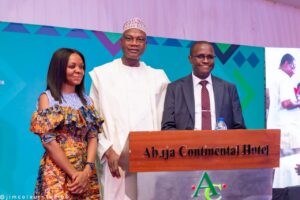

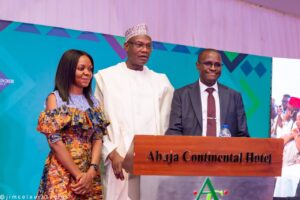


 BIG STORY15 hours ago
BIG STORY15 hours ago
 BIG STORY5 days ago
BIG STORY5 days ago
 BIG STORY2 days ago
BIG STORY2 days ago
 BIG STORY2 days ago
BIG STORY2 days ago
 BIG STORY3 days ago
BIG STORY3 days ago
 BIG STORY1 day ago
BIG STORY1 day ago
 BIG STORY2 days ago
BIG STORY2 days ago
 BIG STORY3 days ago
BIG STORY3 days ago




